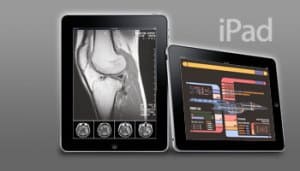
Our 2 cents worth…
We believe the iPad will see the biggest impact in two areas: medical education and patient-clinician communication.
The iPad’s rich user interface, native support for eReading, strong graphics (color) capabilities, ability to use various medical calculators (there are a slew of them already in the AppStore) and numerous other medical apps (most of these are iPhone apps and will need to be updated to take full advantage of the iPad’s larger 9″ screen) provides an incredibly rich ecosystem/learning environment for medical students. Nothing else comes close – a slam-dunk for Apple.
That rich, graphical user interface, it’s inherent e-reader capabilities and portability also lends itself as possibly the best patient education platform yet created to foster patient-clinician interaction. At bedside, a clinician has the ability to review with a patient a given treatment, say a surgical procedure, prior to the operation showing rich anatomical details (e.g., a patient’s 64 slice color enhanced 3D CAT scan), potential risks, etc. Heck, one could even show a video clip of the procedure right there on the iPad. Now that is cool and sure beats the common approach today, some long lecture that oft-times is difficult to follow.
Beyond those two compelling use cases, other uses in healthcare for the iPad include its use by nurses and hospitalists to provide bedside care, tap multiple apps (hopefully multi-tasking will come in OS v4.0 to be announced on April 8th), in an intuitive environment. As to how the iPad may extend beyond these limited boundaries for support of say charge capture and CPOE remains to be seen but in the immortal words of many an Apple iPhone advertisement:
There is an app for that.
And based on some of our initial conversations with mHealth app developers, many are already working on just these types of applications for the iPad, which they hope to bring to market within next several months.
One thing is certain, from at least one data point we received this past weekend, there is strong, initial interest in the medical community as to what the iPad may facilitate. Speaking to one of the technical folks at the local Apple store this past weekend we learned the following: Of the 1,000 iPads sold on Saturday (this store did sell-out), 700 were sold off the floor and 300 were reserved for business customers. Of those “business customers” a significant share of those 300 iPads (north of 30%) were sold to local medical institutions.
One of those local healthcare institutions appears to be Beth Israel Deaconess Medical Center (BIDMC) where an ER doc has provided his own iPad review, based on actual use during a shift. Particularly like his comment about using it for patient education. Might the iPad truly bridge the information gap between patient and clinician? One thing is for certain, it will make it much easier for patient and clinician to confer over a given diagnosis, results and creation of a treatment plan with supporting documentation/graphics.
Read into that what you may but one thing is for certain, there is significant interest in the healthcare sector to at least understand how the iPad may be used within the context of care delivery in a hospital. It remains to be seen as to how end users will actually use these devices and what apps will be developed to serve this market (might Epocrates see stronger uptake for their EMR on the iPad vs. the iPhone?) that take advantage of the larger, 9″ screen, but based on what we have experienced with the iPhone, there are likely more than a few developers right now working on novel applications that clinicians will find valuable. Question is: Will they be valuable enough to augment the extra weight and volume of lugging the iPad versus a smartphone?
Only time will tell.
That being said, based on initial impressions of physicians, such as the one from BIDMC (see above) and our own limited experience in using the iPad this week, the iPad is pretty incredible and could usher in a whole new approach to healthcare IT (interfacing to and interacting with an EMR/EHR system) that may result in physicians adopting and using such technology, willingly. Could we even go so far as to say that the iPad will be a bigger contributor to HIT adoption and use than the $40B in ARRA funding that the feds will spend over the next several years as part of the HITECH Act?
Again, only time will tell.
Appendix:
Some other perspectives on the iPad in healthcare:
Article in HealthLeaders with some interviews with med professionals buying an iPad at Apple store in SanDiego.
ComputerWorld article looking at various business sector (including healthcare) uses of iPad.
Post by iPhone iMedicalApps on some of the current challenges for those adopting an iPad for medical use (virtually all the problems listed will be resolved within next few months)
Another post, this time at iPhoneCTO looks at the iPad in the med space for workforce mgmt.
Well look at this! Children’s Hospital here in Boston announced today (4/8/10) that it has received one of the recent HHS innovation grants to “…investigate, evaluate, and prototype approaches to achieving an “iPhone-like” health information technology platform model…”
Another ER doc writes a review of the iPad.




Adding to the Appendix, there’s also John Lynn’s EMR blogs:
EMR & HIPAA: iPad EMR (http://www.emrandhipaa.com/emr-and-hipaa/2010/04/08/ipad-emr/)
EMR & EHR: iPad EHR or Not (http://www.emrandehr.com/2010/04/06/ipad-ehr-or-not/), which has quite a discussion going on in the comments
and a Dr. Nicholas Genes has an article titled “How the iPad Can Change Emergency Medicine” over at EP Monthly (http://www.epmonthly.com/features/current-features/how-the-ipad-can-change-emergency-medicine/).
Just to toot my own horn, I’ve written a modest apprasial of the iPad’s potential over at Occam Pm’s blog (http://www.occampm.com/blog/general/early-ipad-reactions/). Personally, I think multitasking and security will be the two big determiners of the iPad’s success in medicine. The patient education model is probably the best medical use I’ve read: I definitely agree that could be a real improvement in patient communication, especially with the MU requirement to consider.
I jwrote a piece about the potential for iPads in the ED — it’s up now at <a href="http://www.epmonthly.com/features/current-features/how-the-ipad-can-change-emergency-medicine/"EPMonthly
I agreed that med education would be a likely first step, followed by some PACS radiology interface before full-blown CPOE and charting. I thought I was being reasonable with my (slow) timetable but the vendors who’ve left comments have demonstrated more ambition!
John, agree with you wholeheartedly, “That rich, graphical user interface … lends itself as possibly the best patient education platform yet created to foster patient-clinician interaction.”
For today’s upcoming generation of patients, a high quality video is so much more effective in communicating core concepts. That’s why at Blausen we are developing an iPad -specific version of our successful iPhone/iTouch Human Atlas apps (http://www.youtube.com/watch?v=9Nj3b6Vk-hs). With the expanded screen real estate of the iPad presenting made-for-it apps that fully leverage the device’s advantages it will be a “game changer.” We’re into final development of our Blausen iPad version right now and should launch in next two weeks. Watch for it!
Bruce Blausen, CEO Blausen Medical
http://www.Blausen.com/iphone
There will be much to be done in health care over the next decade and beyond. We have assembled an outstanding group of Benefits Directors, Lean Six Sigma experts, and technology gurus. If you have a question, need to think through a strategy or have a specific project you can reach us at http://www.healthcarebenefitsnetwork.com
Agree with you John on the iPad’s soon-to-come powerful impact in the area of what you call “patient-clinician communication”, or as we say “point of care patient education.” It’s obviously the same thing..
We’re living in an increasingly “video” age. Our Blausen Human Atlas iPhone/Touch app (http://www.youtube.com/watch?v=9Nj3b6Vk-hs), with its 150 3D video animations, has been out a year and successful in bringing to patient bedsides better understanding of core concepts, conditions and treatments. We have the iPad version in accelerated development and should make it available in next three weeks. With that device’s expanded presentation capabilities, the net result will be even better patient understanding and some savings in clinicians’ time invested. We’re excited and believe clinicians with iPads will be, too!
Bruce Blausen CEO Blausen Medical
http://www.Blausen.com/iphone
Both my wife and I are clinicians. She brought an iPad thinking it would be a beefer iPhone. Neither one of us is impressed and it is no where near the functionality of both the iPhone or our MacBooks.
There are major short comings in this glorified media-only device. Unless there are some major redesigns, I cannot believe that this will ever receive adoption in the clinical space.
– doesn’t allow for removable media
– no WiFi (yes, I know it’s coming)
– With all due respect to the other poster, I don’t believe the resolution will support images well enough for them to be useful clinically.
– Most importantly, tell me one major EMR manufactuer who’s designing a Mac interface? yes, I know there are smaller vendors who do.
At the end of this, there are two words that matter to us…Meaningful Use. I don’t care if we print clinical information on a rock, just that it’s usable and allows me to remain compliant. I don’t buy the argument where people say the OS doesn’t matter. It does.
– Can’t change the battery.
– Someone will have to prove to me it’s secure to a government standard (see meaningful use.)
– the “keyboard” is awful! I can imaging me throwing it across the room when I have to type a note in while backspacing every other word.
As much as I hate to say it, I’ll stick with my tablet PC. Your mileage may vary.
I must agree with CP that the iPad has a long way to go before it is the panacea of Electronic health care. The most interesting part of this “Early Adopter” hoopla about a piece of hardware is that there is a definite need for this type of devices. Tablets and slates have been around in healthcare for a long time with very little success. One of the biggest challenges of tablets use with an EMRs is that the UI has not been designed to work with this format. The next is the cost, Tablets have been in the $2500 range making them cost prohibitive in many cases. The lack of a key board seems to add a layer of complexity to EMR usage which is already a challenge.
Tablet devices no doubt has a place in Healthcare but it will take some time to find the ROI. I commend Apple for bringing a product to market this quickly. Now they can take their time to produce a more usable device for the next release. One with a camera, multi-tasking, and maybe a phone module.
Jeff Brandt
http://www.comsi.com
This could be the nail in the coffin for iPhone and Healthcare not to mention enterprise?
The updated iPhone Developer Agreement includes stringent clauses around the acceptable use of storing, transmitting, and processing user data. Here is the updated section 3.3.9 in its entirety.
http://erickerr.com/iphone-agreement-thirdparty
Apple changes their policies like most change socks. As a developer you have to agree on some new policy about every third time you log in to their ADC site.
They wrote this to protect their new ad business. What next? They did mention that they were looking at going into healthcare.
Jeff
The IPad is exciting for consumers and it’s interesting to see that north of 30% of the business purchases were by medical institutions, but I’m not certain there will be enough practitioners interested in investing in the IPad immediately.
Nikolaos I. Kakavoulis MD
Founding Team Member at HealthLeap
http://www.healthleap.com
There is a large gap between what many HOPE the iPad will do and what it actually CAN do. Tablet PCs have been on the market for many years and promised many of the same things. The limiting factor has been (and most likely will continue to be) software. In the US, the ARRA certification (via the HITECH stimulus) will be the badge that differentiates what healthcare facilities will actually support and purchase.
I’ve listed another 10 reasons the current iPad will not be significantly deployed in healthcare if you have the time.
http://www.healthcareitsquad.com/apple-ipad-will-not-be-adopted-for-use-by-health-care-information-technology/#comments
Very interesting topics.I am looking this type of topics, I need more informations because everyone knows “Health is wealth” is very much known to all and everyone wants good health.That means no one wants to leave this wealth. So, Let us build a food habit discipline, keep pace with work, rest and or exercise to Achieve good health, The ultimate wealth.
Interesting. Never thought of that before, but Ipad is definitely good in e-reading and movies imo.
I think the ipad is playing a great role in healthcare .A lot of hospitals and clinics are using as a time saving and real time working environment .